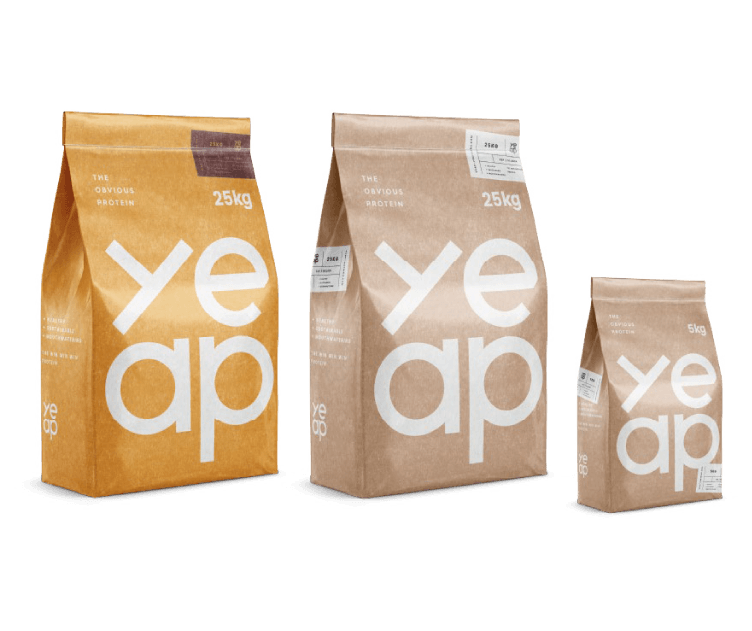Disclosure: The GROW Impact Accelerator is backed by AgFunder, AFN’s parent company.
Last week, we introduced AFN readers to Nubocha and X-Centric: two of the 10 startups participating in the latest edition of the GROW Impact Accelerator – the agrifoodtech acceleration program backed by AgFunder and GROW.
Today, we present Yeap Proteins: an Israeli company that has developed a complete, yeast-based protein product that is produced from industrial sidestreams.
Yeap can be used as a functional ingredient or bulking agent, and can act as a replacement for egg, soy, and milk proteins. AFN interviewed co-founder and CEO Jonathan Goshen (JG) to learn more.
AFN: What problem is Yeap trying to solve, and how does your technology offer a solution?
JG: It’s a well known fact that people today are after less processed and healthier foods. Because of that we see a huge transition towards the use of alternative proteins.
Current ingredients in the market have a small asterisk next to them – whether it is allergens, flavor, not sustainable, or too expensive. This asterisk actually affects three verticals — manufacturers, corporations, and consumers — that simply don’t buy.
At Yeap we are taking the asterisk out of the equation. Our protein is both concentrated and functional, easy to scale up, nutritious, [has] no allergens and high PDCAAS [protein digestibility corrected amino acid score], inexpensive, and circular.
AFN: What gives Yeap its competitive edge and differentiates it from others trying to solve the same problem?
JG: Simplicity. We solve a problem by running a unique process that can be scaled up in a simple, less expensive, and attainable manner ending up with a functional concentrated protein that allows its usage in a variety of applications and end products.
[It is] a complete functional protein, with no allergens, allowing our protein to take part as a functional and bulk ingredient helping manufacturers create cleaner label or less-processed products. A protein that is less expensive and holds sustainability, upcycling, and circularity not just as slogans, but rather as real things. All made by an amazing team of outliers coming from different arenas.
AFN: Could you share any data, case studies, or figures to illustrate the impact that your technologies and solutions can create?
JG: Looking at production process-related parameters [in terms of kilograms of carbon dioxide equivalent (kg CO2 eq)], while chicken requires 1.992 and pea 0.195, Yeap extraction requires very close to zero, or zero.
Looking at land use [measured by point (Pt), a value calculated by dividing the total environmental load of a region by the number of inhabitants and multiplying it by a 1,000 scale factor], while chicken requires 393.392 and pea 307.55, Yeap extraction requires very close to zero or zero.
Looking at water scarcity [in terms of cubic meters of water used], while chicken requires 3.927 and Pea 0.916, Yeap extraction requires way less — only water for the process itself — [which] we will start measuring soon.
AFN: What would you say has been the biggest challenge for Yeap so far?
JG: Our biggest challenge is to take one of the founders’ crazy ideas: looking for additional ingredients that can serve the growing alternative protein market, after preparing homemade nuggets out of yeast, and turn that into an upscale functional concentrated protein made out of downstream yeasts.
AFN: What does ‘impact’ mean to you personally and to your organization? Why is environmental and social impact so important?
JG: Impact to me is making small changes within the one square meter on which I live, the one that I am responsible for. Many small activities generate a big impact. Don’t look for the big changes but rather make a lot of small ones in the environment close to you, and those will converge into a large wave of impact.
At Yeap we believe that the world is an amazing place; but like in the past, present, and as will be in the future, tweaks and adjustments constantly need to be made in order to keep it running, so it can serve us and those to come. At Yeap we actually take yeast waste that otherwise would have been thrown away, and convert that into upcycled functional proteins that can be embedded in many food products. This way we are reusing consumed resources, creating a real circular economy, reducing waste and at the same time saving all the resources — including land, water, and forest — that would have otherwise been utilized to grow other proteins.





